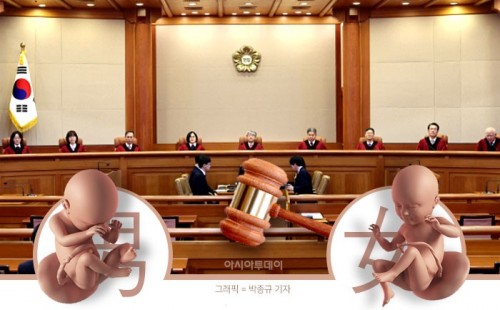 |
| Constitutional judges, including court president Lee Jong-suk, are seen at the grand jury in Seoul on Feb. 28, 2024./ Source: Yonhap News |
AsiaToday reporter Kim Chae-yeon
The Constitutional Court ruled Wednesday that the current medical law that prohibits informing parents of the gender of a fetus before the 32nd week of pregnancy is unconstitutional. As the provision is invalidated, it will be now possible to ask medical professionals about the gender of the fetus regardless of what week of pregnancy.
The court made the ruling against Clause 2 of the Medical Service Act’s Article 20 by a 6-3 vote.
“The ban is not appropriate as a means to achieve the legislative purpose of protecting the lift of the fetus and unnecessarily restricts parents’ right to have uninterrupted access to the fetus’s gender information,” the court said.
The Clause 2 of the Medical Service Act’s Article 20 prohibits doctors from disclosing the gender of a fetus before week 32 of pregnancy. Violators can face up to two years in prison or a fine of up to 20 million won.
The latest constitutional petitioners filed for a trial, claiming that the controversial medical law clause infringes on parents’ rights to access fetus gender information and pursue happiness, and medical professionals’ freedom to practice their profession.
“It is instinctive and natural desire for parents to know the gender of the fetus,” the court said. “It is difficult to recognize causation between the article and abortion, and the stage that the state should intervene and regulate to protect the life of a fetus is the stage in which abortion occurs based on gender, not gender notice.”
On the other hand, Lee Jong-suk and two other justices assessed that the article is inconsistent with the Constitution, rather than it’s unconstitutional, saying there is a need to give parliament the opportunity to revise the medical law to provide minimum level of protection to prevent abortions resulting from learning of a feus’ gender.
In 2008, the Constitutional court issued a constitutional nonconformity ruling towards a now-defunct medical law clause stipulating an outright ban on pre-birth gender tests, leading to the enactment of the current Clause 2 of the medical law’s Article 20, in the following year.
#court #pregnancy #fetus gender #constitutional
Copyright by Asiatoday
Most Read
-
1
-
2
-
3
-
4
-
5
-
6
-
7





















